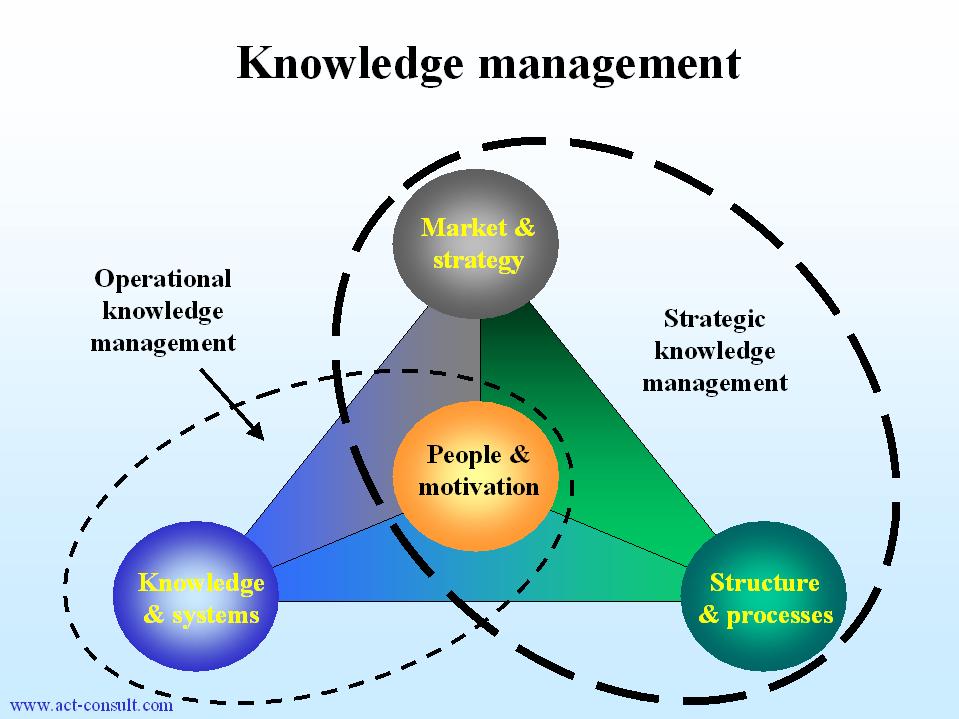Knowledge management is not a new concept, and a review of the literature indicates that “for hundreds of years, owners of family business have passed their commercial wisdom on to their children, master craftsmen have painstakingly taught their trades to apprentices, and workers have exchanged ideas and know-how on the job” (Hansen, Nohria & Tierney 1999, p.106).
Similarly, Dalkir (2011, p.15) asserts that “philosophers, teachers, and writers have been making use of many of the same techniques for decades” to share their knowledge, and Wiig (2000) argues that knowledge management dates back to ancient history. In fact, knowledge, including a necessity to know, has been historically portrayed in theoretical contexts which represent philosophers’ insights, and as a pragmatic approach that manifests itself in managing practical knowledge in battles to survive.
These evidences indicate that knowledge management is not just driven by businesses, and to some extent relates to needs which span hundreds of years. Knowledge management was brought to light at a Swiss management conference in 1986, and was given more consideration in the 1990s, where “the foundation of industrialised economics has shifted from natural resources to intellectual assets, executives have been compelled to examine the knowledge underlying their businesses and how that knowledge is used” (Hansen, Nohria & Tierney 1999, p.106).

In describing knowledge management, Coakes (2003) suggests an anthropocentric perspective in which the critical role of human assets as knowledge holders is highlighted, while the importance of information technology is also considered. Accordingly, Dalkir (2011, p.4) provides a definition that sheds light on both people and the use of information technology, and posits that knowledge management is “the deliberate and systematic coordination of an organisation’s people, technology, processes, and organisational structure”.
It seems that the anthropocentric view adopts a more comprehensive approach to describe knowledge management when compared to the technocratic view, thereby considering both human assets and information technology at the same time. Another perspective is the economic perspective, which commercialises knowledge management and analyses its financial outcomes. This approach highlights knowledge management as practices that organisations incorporate in order to enhance their organisational outcomes.
Drucker believes that “in an emerging economy, knowledge is the primary resource for individuals and for the economy overall” (cited in Malhotra, 2001, p.13). By comparison, Nonaka (1991, p.96) defines this emerging economy, where “the only certainty is uncertainty, the one sure source of lasting competitive advantage is knowledge”. Quinn, Anderson and Finkelstein (1998, p.182) state that the “success of a corporation lies more in its intellectual and systems capabilities than in its physical assets”. Due to this argument, the resource-based approach to the firm’s strategy elucidates knowledge management as a creator of value, which primarily manifests itself in improving firms’ competitiveness (Von Krogh, Nonaka & Aben 2001). Based on this view, Chuang (2004, p.489) describe knowledge management as a “powerful competitive weapon”, thereby embracing a resource-based approach which aims to reveal the motives of creating competitive advantage (Wernerfelt 1984; Amit 1993).
This portrays the importance of knowledge management today, where organisations see themselves in the common challenges such as meeting customers’ needs, staying in the forefront of competition, distinguishing the industry trends to adapt with the changes, enhancing profitability in the existing market, and targeting new markets. Skyrme and Arnindon (1997) elucidate the critical role of knowledge management in increasing customer satisfaction, and posit that effective knowledge management is an essential source for enabling customer focus.
Knowledge management could create value for customers by synthesising and analysing the current data which facilitate relationship development with customers and providing higher quality services and products for them. In this situation, when knowledge management has been highlighted as a critical factor for improving customer focus, it can be argued that organisations need to improve their capabilities in knowledge management to identify and meet customers’ needs in today’s business environment, where competitors have been trying to attract more customers.
References
Chuang, SH 2004 ‘A resource-based perspective on knowledge management capability and competitive advantage: an empirical investigation’, Expert Systems With Applications, vol. 27, no. 3, pp. 459-465.
Dalkir, K 2011, Knowledge management in theory and practice, MIT Press, Cambridge.
Hansen, TM, Nohria N & Tierney T ‘What’s Your Strategy for Managing Knowledge?’ Harvard Business Review, vol. 77, no. 2, pp. 106–116.
Nonaka, I 1991 ‘The Knowledge-Creating Company’, Harvard Business Review, vol. 69, pp. 96-104.
Malhotra, Y 2001, Knowledge Management and Business Model Innovation, Idea Group Publishing, London.
Quinn, JB, Anderson, P & Finkelstein, S 1998, Managing Professional Intellect: Making the Most of the Best, Harvard Business School Press, Boston, MA.
Skyrme, D & Arnindon, D 1997 ‘Creating the knowledge based business’, Business Intelligence, London.
Von Krogh, G, Nonaka, I & Aben, M 2001, ‘Making the Most of Your Company’s Knowledge: A Strategic Framework’, Long Range Planning, vol. 34, no. 4, pp. 421-439.
Wernerfelt, B 1984 ‘A Resource-based View of the Firm’, Strategic Management Journal (pre-1986), vol. 5, no. 2, p. 171-180.
Wiig, KM 2000, Knowledge Management: An Emerging Discipline Rooted in a Long History, In Charles D & Daniele C (ed.), Knowledge Horizons, Butterworth-Heinemann, Boston





